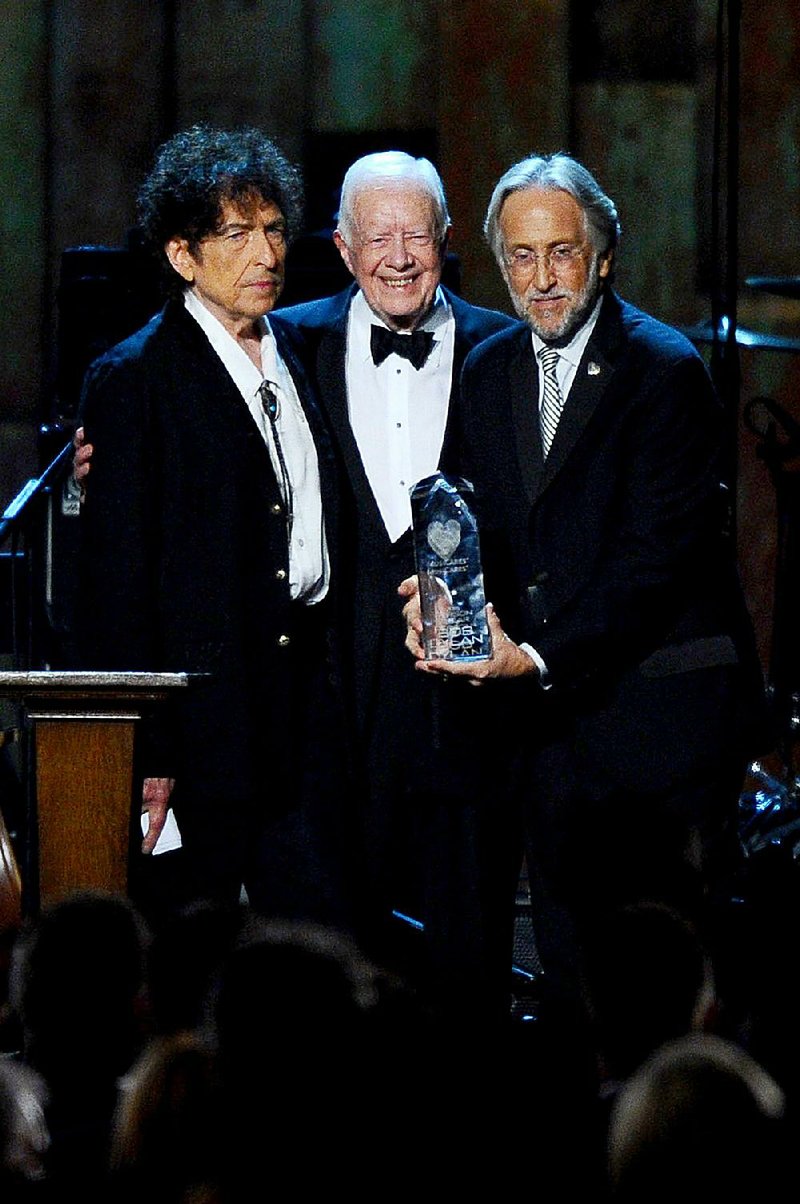JONESBORO -- In a documentary about Bob Dylan's 1965 United Kingdom tour, the folk singer told a reporter that his lyrics had no deep meaning.
"I don't write them for any reason," he said in the film Dont Look Back. "I just write 'em. There's no great message."
Never mind Dylan's words. Fifty years later, academics pore over the meaning of the Hibbing, Minn., native's writing and music. They teach classes on his works, study his prose and include his lyrics in their own writings.
And they gather to share their ideas.
About 30 gathered to discuss Dylan's work Saturday at the Arkansas State University Delta Symposium XXI, a week-long event on the Jonesboro campus that features scholars on music, film and humanities influenced by the Delta region and history.
The event was sponsored by Frances Hunter, an associate professor of English and creative writing at ASU-Jonesboro, who is the editor of Professing Dylan, a collection of essays on Dylan written by university professors.
David Gaines, an English professor at Southwestern University in Georgetown, Texas, spoke about his difficulties in getting permission to use a variety of artists' lyrics in a book he's writing about his love of Dylan.
He wanted to give a subtle nod to Dylan in an article he wrote about those tribulations for the Nov. 24 edition of The Chronicle of Higher Education, but he battled over the title of the piece with editors.
Gaines said he wanted to call his story "Sunday Licenses #2391 and #2460" to mimic Dylan's song "Rainy Day Women #12 and #35."
The editors said their readers were less versed in Dylan trivia and more attuned to academic issues and instead named the article "Tangled Up in Bob."
Michael Perlin, a professor emeritus of law at New York Law School, said he has incorporated Dylan lyrics in about 75 of the 300 scholarly articles he's written about mental health legalities, humility used by lawyers and inequalities of the justice system.
In an article Perlin wrote about the absurdity of the 1995 murder trial of Colin Ferguson, who represented himself after killing six people on the Long Island Rail Road in Garden City, N.Y., Perlin included the words, "Dignity was the first to leave," which appears in Dylan's 1994 song "Dignity."
Perlin, who is so enamored with Dylan that his cellphone ringtone is set to Dylan's concert version of "My Back Pages," said most of the musician's lyrics could apply to the legal realm.
Dylan's song "Walls of Red Wing," a tune about harrowing conditions in a juvenile detention center in Red Wing, Minn., can "be used as a text for the juvenile justice system," Perlin said.
"The Lonesome Death of Hattie Carroll" and "Hurricane" are Dylan's songs of racial issues and civil rights, Perlin said. "Dear Landlord" is a look at property laws, he added.
But interpretations of Dylan's works vary. After Perlin noted the song, a spectator sitting in the back whispered to a friend, "'Dear Landlord' is about jurisprudence? I thought it was about God."
Dylan's structure of writing also was scrutinized Saturday.
Jim Cody, an English professor at Brookdale Community College in Lincroft, N.J., spoke on Dylan's varied rhyming schemes, playing snippets of music and dissecting his words.
"He is in a sandbox of words with a shovel," Cody said. "A great songwriter can slip in words, and you don't even notice it. He's not restricted by the rhyme."
At one point Cody's own devotion to the singer was evident. He referenced Dylan's song "Mr. Tambourine Man," which includes the line, "In the jingle jangle morning I'll come followin' you."
Cody stopped and, almost dreamily, said, "I would follow him anywhere."
Nina Goss, a creative writing professor at Fordham University in Brooklyn, N.Y., said the academic mania for Dylan is well-founded.
"People are committed to the merit and enduring quality of Mr. Dylan's work," she said.
"We do this for free," she said, referring to presenting at seminars. "We tell our students, 'We want you to find this love, too. Whether it's with Dylan or anything else. Find something you love.'"
Dylan classes are taught across the country. He's the subject of popular courses at Vanderbilt, Boston University, Indiana University and Dartmouth.
Dylan's popularity with academia comes from his creative use of words, his ability to meld cultures and his longevity, said Alex Lubet, a University of Minnesota professor of music who also teaches a Dylan course. Lubet was invited to the ASU seminar but could not attend.
"He's a lyricist. He writes terrific songs," Lubet said. "His words are served best with his own performances. Only he can do them that way. He's several cuts above."
Lubet, who teaches a course titled "Bob Dylan," said Dylan knows literature and popular American culture and can intertwine them in his lyrics.
"He's not a kid," Lubet said. "It really shows in his performances. But 18-year-olds are wild about him. They learn about him from their grandparents now.
"There was that old aesthetic that if your parents liked something, you should hate it. That's not the case with Bob Dylan."
State Desk on 04/12/2015
